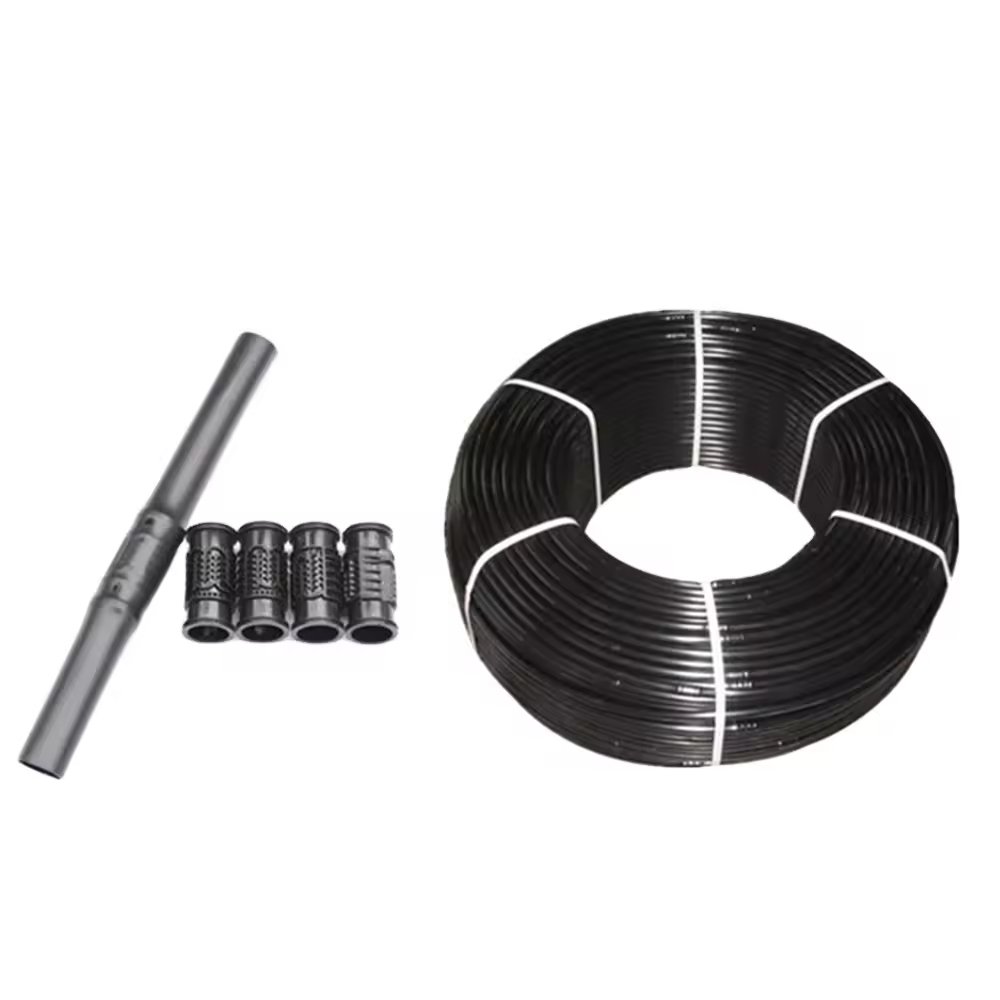

As the global population grows and climate change intensifies, the demand for agricultural water continues to rise, making water scarcity a significant challenge worldwide. In this context, drip irrigation pipe technology, an efficient method of agricultural irrigation, is gradually transforming traditional farming practices, infusing new vitality into the development of sustainable agriculture.
1. Principles and Advantages of Drip Irrigation Pipe Technology
Drip irrigation pipe technology is a precision irrigation system that delivers water and essential nutrients directly to the root zone of plants through slow, controlled drips. Compared to traditional sprinkler or flood irrigation methods, drip irrigation significantly reduces water evaporation and runoff, ensuring that every drop of water is effectively absorbed by the plants. This technology is particularly beneficial in arid and semi-arid regions, where it has yielded remarkable results in agricultural production.
One of the core advantages of drip irrigation is water conservation. Traditional irrigation methods often result in water waste due to uneven distribution and high evaporation rates. Drip irrigation pipes, by precisely controlling the water supply to each plant, minimize unnecessary water loss. Statistics show that drip irrigation can save between 50% and 70% of irrigation water, significantly enhancing water use efficiency.
Additionally, drip irrigation pipes improve soil conditions by reducing erosion and soil degradation. In traditional irrigation, excessive water flow can disrupt soil structure and negatively impact plant root health. By slowly and evenly releasing water, drip irrigation helps maintain soil stability and promotes healthy root growth. Furthermore, drip irrigation reduces weed growth, as water is concentrated near the plant roots, limiting moisture spread on the soil surface and thereby reducing weed germination.
2. Application and Effectiveness of Drip Irrigation in Agriculture
Drip irrigation pipe technology has a wide range of applications in agriculture, particularly in the cultivation of high-value crops where it has proven highly effective. Crops like fruits, vegetables, and flowers are particularly sensitive to water distribution, and traditional irrigation methods can lead to uneven water supply, affecting yield and quality. Drip irrigation allows precise control of water and fertilizer delivery according to the growth needs of the crops, ensuring optimal conditions for growth and significantly improving both yield and quality.
In vineyards, olive groves, citrus orchards, and other fruit plantations, drip irrigation pipes are commonly used. Because fruit trees have extensive root systems and require evenly distributed water, drip irrigation effectively covers the entire root zone, ensuring that each tree receives sufficient water. In these applications, drip irrigation not only enhances fruit yield and quality but also extends the economic life of the trees, improving profitability.
In vegetable cultivation, the advantages of drip irrigation pipes are also evident. Vegetables require frequent watering and are sensitive to water quality. Drip irrigation allows precise control of irrigation amounts according to the growth cycles of different vegetables, preventing issues like soil salinization caused by over-irrigation. Moreover, drip irrigation can be integrated with modern smart irrigation systems, enabling remote control and automated management, further increasing agricultural productivity and management efficiency.
3. Drip Irrigation Technology Supports Sustainable Agricultural Development
In the context of global water scarcity, the promotion and application of drip irrigation pipe technology play a crucial role in advancing sustainable agricultural development. First, drip irrigation increases water use efficiency, reducing reliance on natural water sources and easing the conflict between agricultural production and water resources. Second, the precise fertilization capabilities of drip irrigation reduce the need for chemical fertilizers, lowering the environmental impact of agricultural production and helping to protect ecosystems.
Additionally, the application of drip irrigation technology can improve the quality and yield of agricultural products, enhancing farmers' economic returns. In today’s increasingly competitive global market, crops irrigated with drip irrigation pipes often gain market preference due to their higher quality and consistent yields, thereby boosting farmers' market competitiveness.
Conclusion: Drip irrigation pipe technology, as a significant innovation in modern agricultural irrigation, is gaining widespread application globally due to its water-saving, efficient, and environmentally friendly characteristics. It effectively addresses issues such as water waste and soil degradation associated with traditional irrigation methods, providing strong support for sustainable agricultural production. As technology continues to advance, drip irrigation is expected to be further optimized, offering even greater possibilities for global agricultural production and contributing to the global effort to address water scarcity and environmental challenges.